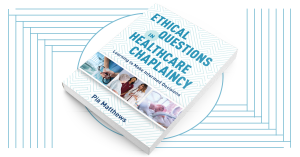
Pia Matthews is a Senior Lecturer of Bioethics, Medical Law, Theology and Healthcare Ethics at St Mary’s University Twickenham. Here, she reflects on how she came to write her new book, ‘Ethical Questions in Healthcare Chaplaincy.’
Guaranteed, when someone finds out that I teach theology and ethics in healthcare the conversation soon turns to ‘when my mother was in hospital….’, ‘my father has just had an operation and….’, ‘my first baby had to be in special care and…’, ‘my friend has just died’. In the same way my students, whether they are studying for the priesthood or working as healthcare chaplains, often come to class with discussions they have had with parishioners or patients, and they ask (naturally without breaking confidentiality, since that is the first lesson to learn) given this sort of situation, what should I have said? However when my students and I look at these conversations it rapidly becomes clear that there is more to it than a question of establishing facts or ways forward. More often than not the question is what do you think this person was really trying to say?
When I first started lecturing in healthcare ethics I decided to use case studies as a kind of hook into the ethics of the situation. This somehow makes it real for all of us and it usually makes the complexity of situations all the more obvious. It provides a concrete link of theory and practice. Of course there are difficulties: case studies may seem to confine the discussion to a particular set of facts. However I have always found that people want to go beyond the situation and explore many more of the ‘what ifs’.
Often the central problem in any discussion is that people have not quite grasped what the situation is really about. Yes there are facts and there are specific ways of dealing with the challenges presented by those facts. We cannot ignore safeguarding or law or central principles like consent, confidentiality, data protection. Indeed applying these principles frequently may give a nice easy answer. Yet there is also a human cry behind every situation – more often than not the cries of several people. So responding in an ethical manner cannot simply be about applying protocols, legislation or hospital policies, important as these are. Being able to ‘see’ the deeper realities is a true skill or gift. Perhaps that gift cannot be taught. But hopefully by going into the depths of the situation, and above all by starting out with listening and observation before judgment and action, we can learn to be a little wiser and more compassionate. We can learn to hear and respond to the cries.
This is why I decided to frame my ethical approach in terms of ‘see, judge, act’. In a way I had permission to apply this method since I am writing for chaplains, for people immersed in theology, and the ‘see, judge, act’ is a theological method. Seeing and grasping the situation is crucial. However just as we need to ‘see’ in a real sense, we cannot leave it at observation. We are also asked to act through the use of practical wisdom. For chaplains it is clear that action may be apparent inaction or ‘being with’ others or accompanying others simply by being there for them. Moreover, in judging we need humility because I may not be the person that is needed in this particular situation and I must resist the temptation to think that I am the only one who can save the world.
However the ‘see, judge, act’ method was still lacking in places. Although I would have liked to use scripture, I was very conscious about being respectful of different faith traditions, different methods of interpretation and understandings. So I developed the POETRY reminder. This reminder begins where everything should, with prayer; that is, a call to a relationship with your Lord and God. It is only through depending on God that we discern what to say and do, when to keep silent and simply be alongside the other person. Certainly we may make mistakes along the way, we may realise that there were better ways of speaking and doing. But if we are open to critical reflective thinking and, above all to the workings of grace, we will bear good fruit.
For more information or to buy ‘Ethical Questions in Healthcare Chaplaincy,’ please follow this link.